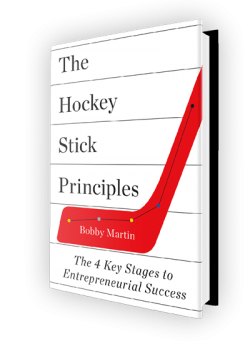I interviewed dozens upon dozens of successful founders for my book, The Hockey Stick Principles. I learned so much from these amazingly successful people, but in all of those conversations, the advice that stuck with me the most came from Bob Young, the founder of Red Hat Software, Lulu, and most-recently PrecisionHawk.
Bob believes that in order to succeed as an entrepreneur, you must be able to create your own luck. To illustrate this theory, Bob cited a story about his brother, Michael, who has learning disabilities but still invariably manages to win the family’s annual fishing tournament. Michael’s strategy? He keeps “lines in the water” by fishing longer hours than anyone else. The more you fish, the “luckier” you’re going to appear to be at catching fish. But in reality, it’s not pure luck. The top winners on Bass Masters prepare better, search better, and thus they attract the odds to their side better than the other guys.
Bob says, too, that entrepreneurs possess a certain degree of innate optimism that helps them keep lines in the water (figuratively), pressing on, seeking balance—not tempting disaster. “When everything is spiraling down out of control, you genuinely believe somehow, some way, some chance, you’ll get lucky,” observed Bob.
He continued: “The great quote for me is Vince Lombardi’s idea that the harder he works, the luckier he seems to get… Because you don’t control luck, but the harder you work, the more you’re putting the odds on your side; betting that good things will come your way.”
My own fishing story
When starting First Research, I recall saying several times that I’d rather be lucky than good. And you know what? I was lucky. In those early days, I used to call face-to-face on anyone who had a pulse and would meet with me, in hopes that they would buy access to First Research. I kept a lot of lines in the water!! Then low and behold, I met with an accounting firm that was very interested in my product, and I discovered that CPAs were a huge untapped industry for First Research. Ding, ding, ding…jackpot!
Create your own entrepreneurial luck
If you are an entrepreneur, here are four ways to create your own luck:
- Leverage the law of averages. Doug Lebda, who founded LendingTree out of his spare bedroom, knew that if he wanted to raise the $650,000 in startup capital then the more people he talked to, the better his chances of getting funding. “I was networking with everybody,” said Doug. He created his own luck.
- Do things in the beginning that don’t scale. When you start a startup, you simply have to test lots of different things…it’s a time of intentional trial and error, even though in the beginning, the various ideas may not pan out. When I started First Research, I used to drive 3-4 hours just to try to land a small account. Sometimes it worked; sometimes it didn’t. And while this practice wasn’t sustainable in the long-term, I kept trying to hook as many fish as I could early on.
- Try again. And again. And again. In her book Grit: The Power of Passion and Perseverance, scholar-psychologist Angela Lee Duckworth hypothesizes that “grit”–not IQ or talent–is the best predictor of success. It’s what pushes you onward in the face of adversity. It’s stick-to-it-iveness at its finest. And while grit isn’t innate for everyone, the good news is that you can nurture tenacity in yourself or in others. Here’s Duckworth’s recipe: Talent x effort = skill. Skill x effort = achievement. Proof that if we are determined, we can create our own luck.
- When opportunity knocks, roll out the welcome mat. Alan Kay, a renowned pioneer in computer science, once said, “The best way to predict the future is to invent it.” So seize every chance you get to improve your leadership and sales skills, your processes, and your product. Read (blogs, books, articles), find a mentor, join an online entrepreneurship community–constantly look for new opportunities to learn and grow as a person. Like the Universe’s Law of Attraction, doing these things will invariably put you in the right place at the right time.
The secret to success
The secret to having luck as an entrepreneur is no secret at all. It simply takes a lot of hard work, creativity, and persistence. Like Bob Young’s fishing champ brother, true entrepreneurs try more and different ways to hook fish, and that extra effort is often what makes them “lucky” (i.e., successful). So try putting some more lines in the water; you may just land the big one.
Sign up to get more great insights directly to your inbox.
As a special bonus, you'll also immediately get access to my inside analysis of what made 172 diverse companies achieve take-off revenue growth.

